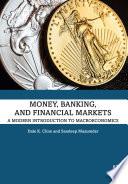
Money, Banking, and Financial Markets
A Modern Introduction to Macroeconomics
This innovative text offers an introduction to money, banking, and financial markets, with a special emphasis on the importance of confidence and trust in the macroeconomic system. It also presents the theory of endogenous money creation, in contrast to the standard money multiplier and fractional reserve explanation found in other textbooks. The U.S. economy and financial institutions are used to explain the theoretical and practical framework, with international examples weaved in throughout the text. It covers key topics including monetary policy, fiscal policy, accounting principles, credit creation, central banks, and government treasuries. Additionally, the book considers the international economy, including exchange rates, the Eurozone, Chinese monetary policy, and reserve currencies. Taking a broad look at the financial system, it also looks at banking regulation, cryptocurrencies, real estate, and the oil and gold commodity markets. Students are supported with chapter objectives, key terms, and problems. A test bank is available for instructors. This is an accessible introductory textbook for courses on money and banking, macroeconomics, monetary policy, and financial markets.
- ISBN 13 : 1000552640
- ISBN 10 : 9781000552645
- Judul : Money, Banking, and Financial Markets
- Sub Judul : A Modern Introduction to Macroeconomics
- Pengarang : Dale K. Cline, Sandeep Mazumder, Sandeep Mazumder, Sandeep Mazumder,
- Kategori : Business & Economics
- Penerbit : Routledge
- Bahasa : en
- Tahun : 2022
- Halaman : 201
- Google Book : http://books.google.co.id/books?id=oSdaEAAAQBAJ&dq=intitle:banking+treasury&hl=&source=gbs_api
-
Ketersediaan :
The U.S. Treasury Department is not an independent entity by any means—it is owned by the American citizens. Created by an act of Congress in 1798, it is the department of the U.S. government that is responsible for managing the ...

